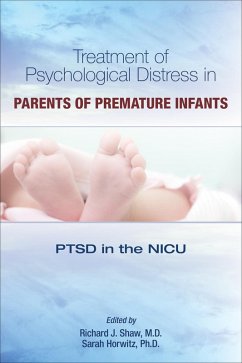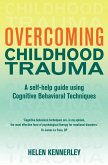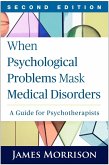At the outset of pregnancy, most parents expect a roughly 40-week journey punctuated by the birth of a healthy baby. When a preterm birth upends these expectations, the effects extend beyond the infant; there are real psychological consequences for the parents themselves.
Treatment of Psychological Distress in Parents of Premature Infants tackles these issues, shedding light on the high prevalence of symptoms of posttraumatic stress disorder (PTSD) in parents following a premature birth.
More than a dozen experts lend their expertise as they examine not only the medical and neurological consequences of premature birth on infants but also recent findings on the psychological effects of premature birth on parents -- including the particular issues that fathers experience, which receive their own chapter.
Uniquely, this volume outlines a comprehensive programmatic approach to psychological consultation in the neonatal intensive care unit (NICU). The authors describe how to leverage common interventions -- including trauma-focused cognitive-behavioral therapy -- in innovative ways to reduce symptoms of anxiety, depression, and PTSD in NICU parents.
A chapter that focuses on vulnerable child syndrome underscores the implications of failing to address PTSD symptoms on parenting and child development and offers a parent-focused intervention to reduce unhealthy patterns of overprotective parenting.
The insights offered throughout the book -- as well as in the complementary online treatment manual -- will position readers to develop an entire program of psychological services, from screening to intervention, in the NICU.
Treatment of Psychological Distress in Parents of Premature Infants tackles these issues, shedding light on the high prevalence of symptoms of posttraumatic stress disorder (PTSD) in parents following a premature birth.
More than a dozen experts lend their expertise as they examine not only the medical and neurological consequences of premature birth on infants but also recent findings on the psychological effects of premature birth on parents -- including the particular issues that fathers experience, which receive their own chapter.
Uniquely, this volume outlines a comprehensive programmatic approach to psychological consultation in the neonatal intensive care unit (NICU). The authors describe how to leverage common interventions -- including trauma-focused cognitive-behavioral therapy -- in innovative ways to reduce symptoms of anxiety, depression, and PTSD in NICU parents.
A chapter that focuses on vulnerable child syndrome underscores the implications of failing to address PTSD symptoms on parenting and child development and offers a parent-focused intervention to reduce unhealthy patterns of overprotective parenting.
The insights offered throughout the book -- as well as in the complementary online treatment manual -- will position readers to develop an entire program of psychological services, from screening to intervention, in the NICU.
Dieser Download kann aus rechtlichen Gründen nur mit Rechnungsadresse in A, D ausgeliefert werden.









